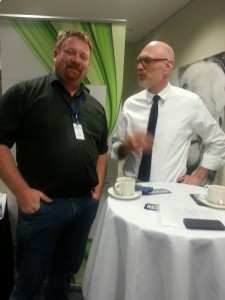Re:Thinking a Public Faith Conference (Day 2) #rethinking2014
Day 2 of the Re:Thinking Conference has been a full and substantial one. It began with worship. John Dickson took us into Philippians 1, which is clearly the scriptural ground in which his stump speech is rooted, for he ended with the “choose mission, not admonition” line that was part of his recent lecture tour to Hobart.
Miroslav had delivered his programmatic framework yesterday: Religious Exclusivism (RE) does not demand Political Exclusivism (PE), and neither does Political Pluralism (PP) demand Religious Pluralism (PP). He opened by contrasting this with the notions of people like Tony Blair who presupposes that the path to Political Pluralism necessarily lies along the path of Religious Pluralism.
Wonderfully, later in the day Julian Burnside (a non-Christian speaking strongly and agreeably on asylum seekers) unwittingly echoed Tony Blair right to the detail – asserting that “we can get along” (applause) because “Christians and Muslim believe in the same god” (silence, crickets, we had all heard Miroslav earlier that day…) Burnside was an unwitting case study for Volf’s entire kerygma at this conference.
Returning to the morning session, Volf’s purpose was to unpack the terms. Religious Exclusivism, for instance, is not a negative. John 14 is quite clear about Jesus being exclusively the Way the Truth and the Life. Jesus declares himself to be normative, even if not superior. Jesus is RE! In contrast Religious Pluralism is a relativism: all faiths are equal with just cultural or stylistic differences.
Political Exclusivism allows one faith dominate. For Miroslav the Christendom project is therefore a form of PE and a form of tolitarianism. Parallels can be drawn between Calvin’s Geneva and the Taliban’s Kabul in terms of public faith and moral expressions.
Tony Blair (and Julian Burnside) is antagonistic to Volf in that there is an assertion that PP demands RP. There is also the antagonist who asserts that RE demands PE and therefore Religious Exclusivists (such as Christians) should be actively repressed. The irony that this, itself, is a form of Political Exclusivism was one of Miroslav’s chief points.
Another antagonism is the suggestion that PP erodes RE. This is the opposite direction to Burnside and Blair – that PP is undesirable because it will erode religious distinctives. Volf’s counter is that PP stabilises exclusive beliefs, but only if they don’t take themselves for granted. Exclusive beliefs with strong truth claims not only persist, but are strengthened in their existence by a pluralistic context.
The take-home point in all this for Christians is to eschew an over-realised eschatology. The Kingdom of God is not yet. If it were, then the dynamic of striving for it (a crucial dynamic to Christian ethics as well as spirituality) would be absent, and it isn’t. The Kingdom of God is not yet, and therefore the idea of a “Christian” nation is eschatologically abhorrent.
Volf’s bold claim is this: “The Christendom Project was a Mistaken Project.” A big call. And one that needs some backing up with some historical analysis. (e.g. what was the alternative to the Christendom – anarchy? Islamic rule?) But nevertheless it’s a worthwhile call to here, to help us cut through, what he later called in the Q&A session “they hypocritical crap.”
TWO-UP SPEAKER #1 – JUSTINE TOH
After Morning Tea a combo-session with two speakers (a “Two-Up” session) commenced. The two were related and, from different angles, critiqued from a Christian perspective the rise of Bourgeoisie and Bohemian analogues in modern Western Society.
Justine introduced us to them – half yuppy – half hippy, counter-cultural with a capitalist bent, Bourgeoisie/Bohemians – Bobo’s! The sort of people that live quinoa, and know how to pronounce it. (NB. I am on a paleo diet myself – or was until this conference!). These are the new elite, the feel good, Prius driving, cause-promoting, rich, health nuts. They are not Kath & Kim, they are who Kath & Kim want to be.
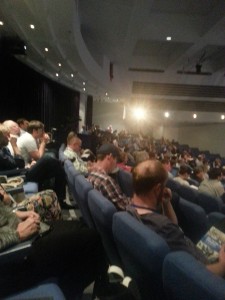
It’s a caricature of course (although some of their exemplars are ripe for some caricature), but Justine’s point was serious. This subculture is a touchstone on broader trends in Western Society which particularly surround the view of the Body. There is an almost idolatrous identification of the notion of a “flourishing life” with the necessity of having a functional (and beautiful!) body. Hence paleo diets, and tough mudder, and fitness regimes, and online jogging trackers are all the vogue – they are all “body projects” that reveal this underlying projection that “I have the right to be unlimited” (to quote an smartphone ad) and “it’s my body that will do that for me!”
Justine unpacked how this is ultimately self-defeating. The Western absolutisation of freedom of choice, far from being activated by a “body project” actually finds its limits in the body – for we all have bodies that will age, and perish. The telos, the point of a body project is therefore to delay the inevitable end – it’s an “anti-telos” of sorts.
But in the midst of this tension there is a place of connection with Christian spirituality. Because in the end, the elevation of the body, elevates a “right way” of doing things – and an objective right way at that. The body has a nature that must be served (but good eating and so forth). It demands self-control and discipline.
There are some inconsistencies to interact with here – how can the same group of people be so “hands on” about food, asserting the “right way” of doing things, but so “hands off” about sex, in which self-control and discipline are seen as a form of repression.
And there are some points of connection: the natural extrapolation of the Bobo mindset has some Christian connectors; we are not free just because we can choose, we become free when we choose well. Ultimately the choice of Jesus is to choose life and life to the full.
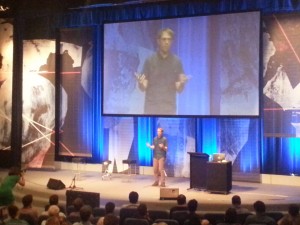 TWO-UP SPEAKER #2 – MARK SAYERS
TWO-UP SPEAKER #2 – MARK SAYERS
I’ve never head of Mark Sayers before, but I was impressed by this thoughtful young man. I shall read his book.
Mark has one of those awesome prophetic voices that are well-grounded in history.
In this case the prophetic side related to his interaction with younger Christians. They are well and truly post-Christendom. There defining question is not “How can I be relevant?” but “How can I be resilient?” In other words, they know they are not in Christendom (it’s like the bubonic plague – it was bad, it should be avoided, but not with us any longer!), they know they are on the margins, and they want to have strength to stand.
Sayers historic side unpacked the historical routes of Bohemianism, from the routes in revolutionary and post-revolutionary Paris, through to the “cultural creatives” – a global aesthetic that shares the hallmarks of being outside of the mainstream, and waiting to replenish and reinvigorate.
The point of this analysis was to not only to tie this movement to the “cool” hipsterism of the current day, but to point out the negative and destructive forces that are inculcated into the mindset. To connect with the prophetic, interaction with the current “bohemians” is no longer about interacting with relativism, but about interacting with intolerance for the Christian (and any other ‘mainstream’) viewpoint. For Sayers, there is a “thin enlightenment” that is prevalent both historically and currently.
Sayers also looks at the historical negative patterns of Bohemianism – including the connections with German romanticism, which was the spawning ground for a homeless artist, who sat himself outside of the current world, who was part of folk groups that called their leaders “Fuhrer” and greeted one another with “Heil.” There is a romanticism within Nazism. Hitler, as Sayers asserts, was cool in his day. And today’s cool creative minorities do not adequately avoid this pitfalls.
A Christian engagement for Sayers requires a willingness to be like the middle part of Jonah – not avoiding to go a the beginning, not sitting and sniping with judgement at the end, but going and engaging thickly and creatively.
There is application here in discipleship that connects with things I learned from the George Savvides elective yesterday. And it provides similar food for thought about how we can not only speak into this context, but foment truly creative Jesus-focussed, “thick”, self-generating conversations within it: i.e. decent ‘soft-edges’ discipling.
ELECTIVE – A CHRISTIAN RESPONSE TO CLIMATE CHANGE
I deliberately chose this elective because of my Tasmanian context in which there is very little robust dialogue on environmental issues beyond picking sides politically. Byron Smith was the presenter who has an academic pedigree in both the scientific and ethical field.
One thing I wanted was information. He delivered on this in spades, unpacking data, and projections, and implications and so on. There was nothing particularly surprising in this, but it was stuff I have not had time to collate myself, and he is now a trusted source of such information.
Byron raised four questions: Is it happening? Did we do it? Will it be bad? What can we do? The first three of these are the informational ones. His response to the fourth focussed on our personal responses (including emotional responses) including some aspects of how we can influence a capitalist world to take note of the views of the consumers.
What I hoped for, perhaps naively, was some insight into how to address the issue politically. As George Savvides said in his elective yesterday, numbers do not motivate, figures and stats and diagrams do not change hearts and minds – something else does. Both fear and hope do that. I haven’t yet heard a fulsome public articulation of fear and hope on this issue. A very worthwhile elective nonetheless.
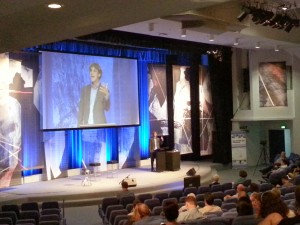 TOPICAL SPEAKERS – GREG LAKE and JULIAN BURNSIDE
TOPICAL SPEAKERS – GREG LAKE and JULIAN BURNSIDE
I’m glad that they had a session on asylum seekers. My wife went to an elective with Brad Chilcott of Welcome to Australia which focussed on local responses to refugees. In this session two speakers spoke with regards to asylum seeker policy itself.
Greg Lake was a young bureaucrat who worked on Christmas Island and later in a very senior position at Nauru. After working alongside asylum seekers, holding contractors to account, and managing the micromanagement of various Ministers, he found himself unable to reconcile his job with his faith and he resigned. He is not now an advocate, or a whistleblower, but he is willing to talk about what he observed within that job, and to describe the real world implications of various policies as they applied. I won’t rehearse them here, except to say that I want to get him down to Tasmania and spend some time talking to people about his experience.
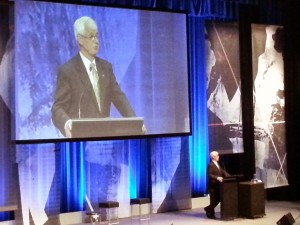 Julian Burnside is someone that those involved with asylum seekers will have heard of. His comments were much the same as what he has said in other places and at other times. This included his articulation of alternatives to current policy that would achieve the same effect without the cruelty: i.e. either decent processing in Indonesia; or processing in Australia while integrating into rural communities. These are described in many places with connection to Burnside and I won’t rehearse them here.
Julian Burnside is someone that those involved with asylum seekers will have heard of. His comments were much the same as what he has said in other places and at other times. This included his articulation of alternatives to current policy that would achieve the same effect without the cruelty: i.e. either decent processing in Indonesia; or processing in Australia while integrating into rural communities. These are described in many places with connection to Burnside and I won’t rehearse them here.
His main emphasis was on the use of misinforming language by the current and former governments. After all, he pointed out, the current regime of off-shore detention is entirely reasonable if, in fact, those who are detained are criminals who are bent on causing havoc in our society. But the reality is that they are not. It is not as if the Australian public are heartless, is just that they have been sold a lie.
Burnside is never backwards in coming fowards, and there was one thing in which I echoed his strong language. Namely, he asserts that those in government, when they say they care about stopping drowning at sea, are being insincere. They don’t care, he asserts. And here’s why: because the introduction of Temporary Protection Visas, apart from anything else, makes voyage by boat the only possible means for families to be reunited. If you care about drownings at sea, you cannot introduce TPVs and be sincere in that concern.
IN THE END
A long day, with some great conversations, shared lunches, and the best Chinese food I have ever tasted, shared with my wife in Sussex Street. The conference ends tomorrow lunchtime, but not until we’ve heard from John Dickson, Miroslav Volf again, and also Melinda Tankard Reist and Michael Spence.
![]() Re:Thinking a Public Faith Conference (Day 2) #rethinking2014 by Will Briggs is licensed under a Creative Commons Attribution-NonCommercial-ShareAlike 4.0 International License.
Re:Thinking a Public Faith Conference (Day 2) #rethinking2014 by Will Briggs is licensed under a Creative Commons Attribution-NonCommercial-ShareAlike 4.0 International License.

